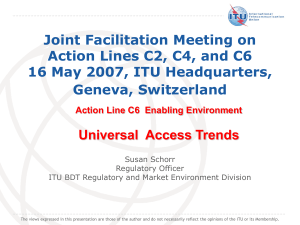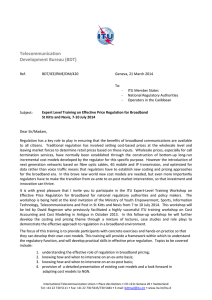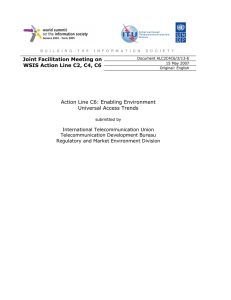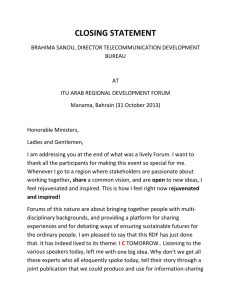BROADBAND FOR SUSTAINABLE DEVELOPMENT WTISD
advertisement
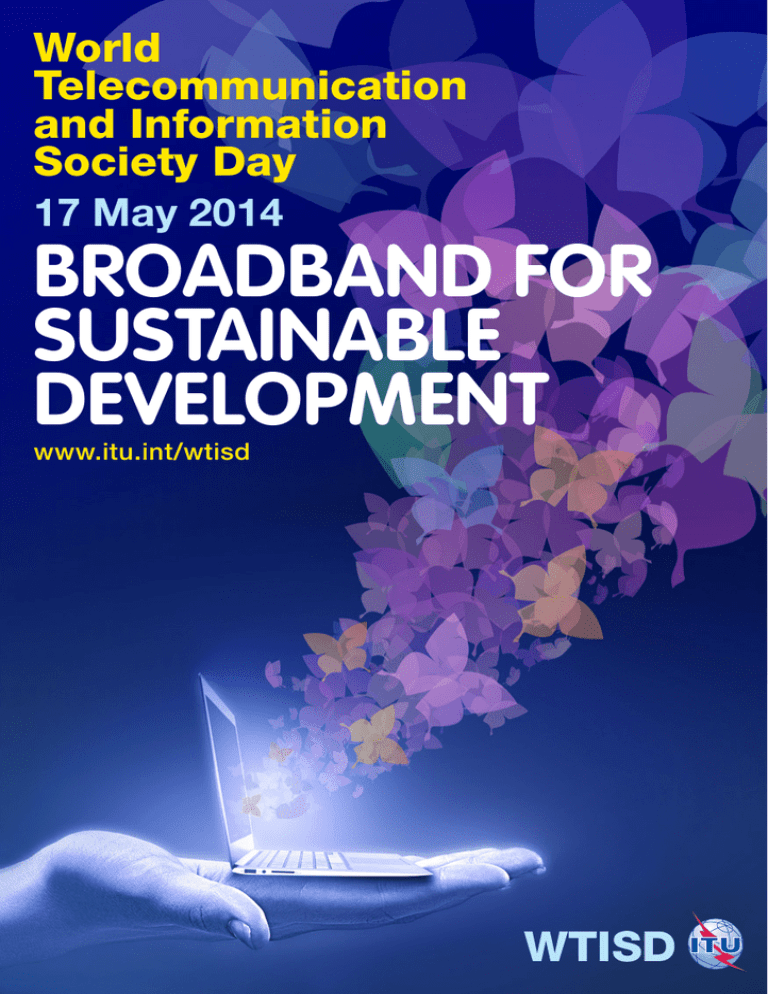
World Telecommunication and Information Society Day 17 May 2014 BROADBAND FOR SUSTAINABLE DEVELOPMENT www.itu.int/wtisd WTISD World Telecommunication and Information Society Day, celebrated each year on 17 May, marks the establishment of the International Telecommunication Union in 1865. The theme for 2014 is ‘Broadband for Sustainable Development’ We focus attention on multi-stakeholder commitment to achieve universal access to broadband connectivity and content and foster political will on achieving this objective; identify key gaps in broadband research and development, infrastructure, and packaged development of applications and services; define policy priorities for action in the areas of allocating radio frequency spectrum for broadband, universal access obligations and innovative financing mechanisms; and lead to technological solutions, particularly in the extension of broadband access into rural areas, least developed countries and small island developing states. Given that estimates suggest that mobile broadband subscription may achieve 10 billion by the end of this decade and that over 90 per cent of international data traffic runs over fibre-optic cables ITU’s thrust to push the broadband agenda for sustainable development focuses on the dual goals of supporting the deployment of mobile broadband based on ITU’s International Mobile Telecommunications (IMT) and the continued rollout of fixed-line technologies. Broadband infrastructure development is a critical element in ensuring that ICTs are used innovatively as delivery vehicles for health, education, governance, trade and commerce in order to achieve sustainable socio-economic growth and address the post-2015 development agenda. 2 T Message from Mr Ban Ki-moon, UN Secretary-General This year’s World Telecommunication and Information Society Day focuses on leveraging information and communication technologies to help advance sustainable development. ICTs are powerhouses of the global economy, offering solutions for sustainable economic growth and shared prosperity. Broadband connectivity is a transformative tool to achieve the three pillars of sustainable development – economic growth, social inclusion and environmental balance. It is a key element of the debate on the post-2015 development agenda. Broadband networks provide smart eco-friendly solutions to manage booming cities and transport systems; enhance efficiency for manufacturing industries and power generation; conduct long-distance diagnosis and treatment for patients in remote locations; and promote innovative educational applications for students around the world. As ITU approaches its 150th anniversary next year, let us work together to bridge the digital divide and harness the power of technology to create a better and more sustainable future for all. Mr Ban Ki-moon UN Secretary-General 3 W Message from Dr Hamadoun I. Touré, Secretary-General, ITU World Telecommunication and Information Society Day 2014 marks the 149th anniversary of the establishment of ITU in 1865. The remarkable history of ITU exemplifies its stellar role in connecting the world to the most advanced and innovative means of communication, from the days of the telegraph to the Internet and mobile broadband which now allows us to be in touch anytime, anywhere with friends, family, colleagues and even things. The right to communication is central to the information society; it is a key principle for equitable and universal access to information and knowledge that in turn empowers people to meet their aspirations and achieve their development goals. Broadband connectivity is a critical element today in ensuring that information and communication technologies are used as effective delivery vehicles for health, education, governance, trade and commerce in order to achieve sustainable socio-economic growth. ITU is therefore committed to achieving universal access to broadband connectivity – and to foster the political will needed to achieve this objective. This year, on World Telecommunication and Information Society Day, we focus on the theme: “Broadband for Sustainable Development”. It is now well recognized that digital development is a transformative tool to fast-track sustainable development. In order to realize its full potential, it is essential to roll-out high-speed broadband networks, making it affordable as well as universally accessible. 4 In this respect, ITU and the Broadband Commission for Digital Development are at the forefront of advocating the roll-out of broadband as a means of achieving sustainable development. This was further underlined by the World Telecommunication Development Conference this year to focus on the theme “Broadband for Sustainable Development”. ITU’s thrust to push the broadband agenda for sustainable development focuses on the dual goals of supporting the deployment of mobile broadband and the continued rollout of fixed-line technologies along with a thrust on meeting the global challenges of our times, such as combating climate change. Broadband-based ICT networks are powerful cross-cutting enablers to achieve the three pillars of sustainable development – economic growth, social inclusion and environmental balance. I call upon our partners – governments, industry, academia and technical experts – to identify key gaps in broadband research and development, infrastructure, and packaged development of applications and services; define policy priorities for action in the areas of allocating radio frequency spectrum for broadband, universal access obligations and innovative financing mechanisms; and to seek leading edge technological solutions, particularly in the extension of broadband access into rural areas, least developed countries and small island developing states. Let us put our resources together to harness the catalytic role of ICTs in achieving sustainable development. It is the key to ensuring a better future for all. Dr Hamadoun I. Touré ITU Secretary-General 5 WTISD EVENT PROGRAMME 10:30Arrival of delegates 10:45Arrival of Laureates with ITU Secretary-General in Popov Room Introductions with ITU Deputy Secretary-General and Directors of Bureau Group photo 11:10 Message by UN Secretary-General Mr Ban Ki-moon 11:15 Keynote speech by Dr Hamadoun I. Touré, ITU Secretary-General 11:20Presentation of WTISD Awards to three distinguished laureates and acceptance speeches H.E. Mr Paul Kagame, President of the Republic of Rwanda H.E. Ms Park Geun-hye, President of the Republic of Korea r Carlos Slim Helú, Chairman, Grupo Carso and President, M Carlos Slim Foundation 11:45 Round-table discussion 12:30 Ceremony closes 6 WTISD Broadband for Sustainable Development: A Call for Action 1 2 3 4 Develop and adopt national policies and plans promoting the roll-out of broadband networks, applications and services. Ensure broadband connectivity and digital inclusion for all, through broadband backhaul, wireless or wireline, and including satellite communications. Connect community telecentres for Internet access, in particular schools. Develop and implement national policies to restructure current education systems and infrastructure, integrating science and ICT-related subjects with mainstream curricula to better respond to present industry needs and standards as well as future ICT workforce requirements. 7 WTISD2014 Laureates LAUREATES Mr Paul Kagame, President of the Republic of Rwanda, was born in October 1957 in Rwanda’s Southern Province. His family fled pre-independence ethnic persecution and violence in 1960, crossing into Uganda where Kagame spent thirty years as a refugee. WTISD 2014 H.E. PAUL KAGAME PRESIDENT OF THE REPUBLIC OF RWANDA In 1990, Paul Kagame returned to Rwanda to lead the Rwandan Patriotic Front’s (RPF) four-year struggle to liberate the country and set it on its current course towards reconciliation, nation building and socioeconomic development. Paul Kagame took the Oath of Office as President of the Republic of Rwanda on 22 April 2000 after being elected by the Transitional National Assembly. President Paul Kagame won the first ever democratic elections held in Rwanda in August 2003 and was re-elected to a second seven-year mandate in August 2010. President Kagame has received recognition for his leadership in peace building and reconciliation, development, and advancement of education and ICT. His leadership has guided African development overall and promoted the ICT sector as a dynamic industry as well as an enabler for Africa’s socio-economic transformation. In 2007, Kigali was the venue for the Connect Africa Summit, which resulted in investment commitments amounting to over USD 55 billion, with the ICT industry taking the lead. In 2013, the Transform Africa Summit was co-hosted by President Kagame and ITU Secretary-General Dr Hamadoun I. Touré. President Kagame currently serves as chair of the UN Secretary General’s Advisory Group on UN MDG Advocacy Group and as co-chair along with Carlos Slim of the UN Broadband Commission for Digital Development. Paul Kagame is married to Jeannette Nyiramongi and they have four children. He is a keen tennis player and football fan. 9 WTISD2014 Laureates H.E. PARK GEUN-HYE PRESIDENT OF THE REPUBLIC OF KOREA WTISD2014 Laureates Ms Park Geun-Hye, President of the Republic of Korea, was born on 2 February 1952. She graduated from the Sacred Heart Girls’ High School, Seoul in 1970 and went on to earn a Bachelor of Science in Electronic Engineering from Sogang University, Seoul in 1974. She has been bestowed with Honorary Doctorates in Literature by the Chinese Culture University, Taiwan; in Science by the Korea Advanced Institute of Science and Technology, Daejeon; and politics by Pukyong National University, Busan and Sogang University, Seoul. In her professional experience, Ms Park has held several key posts, including Chairman of the Yukyoung Education Foundation, the Youngnam University in Daegu, and the Korea Culture Foundation. 1974-79, she was Acting First Lady of the Republic of Korea and has also served as Honorary President of the Girl Scouts of Korea. 2004-2008, Ms Park was a Member of the 17th National Assembly and served on Committees for National Defense, Government Administration and Local Autonomy and for the Environment and Labour. In 2012, she was a Member of the 18th National Assembly and served on Committees for Health, Welfare and Family Affairs, Strategy and Finance and was also Chairman of the Emergency Committee of the Saenuri Party. In December 2012, Ms Park Geun-Hye was elected as the 18th President of the Republic of Korea The Republic of Korea has consistently topped ITU’s ICT Index for Measuring the Information Society. The Government has unveiled a set of long-term plans that foster creative talent, a move that establishes a new paradigm towards building a vibrant national economy in a digital environment. It has demonstrated that innovation is the route to success in the digital world. 10 MR CARLOS SLIM HELÚ PRESIDENT, CARLOS SLIM FOUNDATION AND CHAIRMAN, GRUPO CARSO A Mexican and a son of Lebanese immigrants, Carlos Slim Helú is widely known as a successful businessman and a prominent philanthropist. A self-made man, he achieved success in the world of business through investments in a diverse range of industries as reflected in the portfolio of the Carso Group, which include infrastructure and construction, financial services, retail and commercial services, as well as telecommunications. Carlos Slim Helú studied Civil Engineering at the National Autonomous University of Mexico, where he also taught Algebra and Linear Programming while studying for his degree. Mr Slim’s interest for technology is long standing. América Móvil is currently the leading supplier of telecommunication services (fixed line, mobile, Internet, and TV) in Latin America. It also operates in the USA and Europe. He is committed to the promotion of technologies for development and has been cochairman of the UN Broadband Commission for Digital Development since 2010. Mr Slim’s main focus today is promoting social development in Mexico and Latin America through the Carlos Slim Foundation, which has impacted the lives of millions of people around the world. Initiatives include early childhood development, providing over 360,000 scholarships to students and young entrepreneurs, setting up over 3600 digital classrooms and libraries in Mexico, the rehabilitation of Mexico City’s historic district, the preservation of Mexico’s natural areas and the construction of Museo Soumaya, home to one of the finest art collections in the world. Mr Carlos Slim Hélu has received a number of awards for his business and social activities, including the Lebanese Gold Order of Merit; the Decoration of the Commander Leopold II, granted by the Belgium Government; and the Red Cross Badge of Honour and Merit for his long-standing humanitarian work. 11 E Every year on 17 May, ITU celebrates World Telecommunication and Information Society Day (WTISD) to mark the founding of the organization in Paris in 1865. This year, ITU celebrates its 149th anniversary. ITU presents the annual World Telecommunication and Information Society Award to eminent personalities who have contributed towards leveraging the catalytic role of ICTs in creating far-reaching opportunities for humanity. The Award focuses on the overarching theme, which for 2014 is: BROADBAND FOR SUSTAINABLE DEVELOPMENT Broadband-based ICT networks are powerful cross-cutting enablers to achieve the three pillars of sustainable development – economic growth, social inclusion and environmental balance. Digital technologies are transformative tools to fast-track sustainable development. In order to realize their full potential it is essential to roll-out high-speed broadband networks, making it affordable and universally accessible. www.itu.int/wtisd2014
